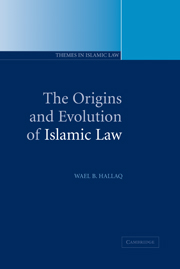Book contents
- Frontmatter
- Contents
- Maps
- Map 1 Arabia ca. 622 ad
- Map 2 Muslims lands in the third/ninth century
- Introduction
- 1 The pre-Islamic Near East, Muḥammad and Quranic law
- 2 The emergence of an Islamic legal ethic
- 3 The early judges, legal specialists and the search for religious authority
- 4 The judiciary coming of age
- 5 Prophetic authority and the modification of legal reasoning
- 6 Legal theory expounded
- 7 The formation of legal schools
- 8 Law and politics: caliphs, judges and jurists
- Conclusion
- Glossary of key terms
- Short biographies
- Bibliography
- Suggested further reading
- Index
Conclusion
Published online by Cambridge University Press: 05 June 2012
- Frontmatter
- Contents
- Maps
- Map 1 Arabia ca. 622 ad
- Map 2 Muslims lands in the third/ninth century
- Introduction
- 1 The pre-Islamic Near East, Muḥammad and Quranic law
- 2 The emergence of an Islamic legal ethic
- 3 The early judges, legal specialists and the search for religious authority
- 4 The judiciary coming of age
- 5 Prophetic authority and the modification of legal reasoning
- 6 Legal theory expounded
- 7 The formation of legal schools
- 8 Law and politics: caliphs, judges and jurists
- Conclusion
- Glossary of key terms
- Short biographies
- Bibliography
- Suggested further reading
- Index
Summary
With the massive migrations during the centuries preceding the rise of Islam, many large tribal federations from south Arabia had finally come to settle in southern Iraq and Syria, where they established themselves as powerful vassal kingdoms of the Sasanid and Byzantine empires. Despite their intermittent function as protectors of the imperial powers against tribal penetration from the south, these flourishing kingdoms constituted significant links between the Peninsular Arabs and the Fertile Crescent. Migration of the southern Arabs to the north – and much less frequently from the north back to the south, south-west and south-east – continued incessantly, and with it the shifting of demographic boundaries worked in favor of an increasing proportion of Arabs settling in the Fertile Crescent. This constant demographic movement and penetration was supported by trade and commerce that served the interests of both the tribal and sedentary Arabs of the south and of those societies in the Fertile Crescent, if not of the imperial powers that indirectly ruled the entire northern regions. Vibrant religious movements and missionaries further encouraged the otherwise intensive contacts between the Peninsula and the north. Yet, it was mainly trade – whether on a massive or more modest scale – that exposed the Hejaz, the birthplace of Islam, to the cultures of the north, thus making the Peninsula a more or less integral part of the all-pervasive Near Eastern culture.
- Type
- Chapter
- Information
- The Origins and Evolution of Islamic Law , pp. 194 - 206Publisher: Cambridge University PressPrint publication year: 2004



